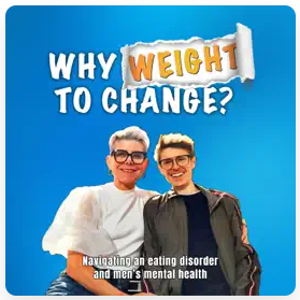Mental health has been thrust into the spotlight, but some stigma still lingers in the shadows
August 11 2021

It all started on 20 February 2019. An innocence and contentment were lost when my brother was taken by sepsis. This trauma overshadowed everything my previously jolly 16–year-old self had encountered.
Upon my return to boarding school, I was told that the only staff member trained to support me through bereavement was the school chaplain. My grieving self swiftly declined. Because of this, I began to explore bereavement support from charities.
With my GCSEs fast approaching, my mental health unfortunately was not at the forefront of my mind. Both Cruse Bereavement and The Laura Centre were incredible in their mental health support, and I began to wonder why this was not available in my own school.
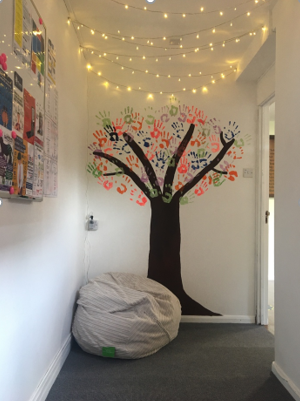
Our intern Evie's wellbeing room that she created at her boarding school to help with children and young people's mental health and wellbeing at school.
I was new in the sixth form of this school and my mum by chance signed me up to a MHFA England Youth First Aid course. I was the only teenager on the course; members of staff and pastoral leads shared their innovative approaches and ideas, and it opened my eyes to what other schools and communities were doing to support their young people. I returned to school with ideas and strategies to improve the mental health support, starting with a school wellbeing room.
The wellbeing room, my most beloved creation, was a space solely for mental health education and the promotion of self-care. I presented the idea to pastoral heads at the school, and instead of a room for the whole school, I was given a box room within my own boarding house to use as a pilot before implementation in the wider community. In this tiny room full of bin bags and cobwebs my friends and I cleaned, painted and decorated the space into a mental health haven. The room was then filled with leaflets of information, posters, and positive affirmations to make sure any visitor left feeling a little brighter then when they entered.
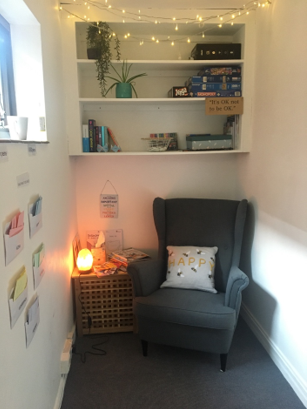
Evie's wellbeing room for school children and young people's mental health and wellbeing
After reading around sensory rooms typically created for people with autism and other emotional and behavioural difficulties, I realised it was important to appeal to all the senses to create a relaxing atmosphere. This was the reasoning behind the soft fairy lights and salt lamp, reed diffuser and soft furnishing to all induce calm and feelings of safety.
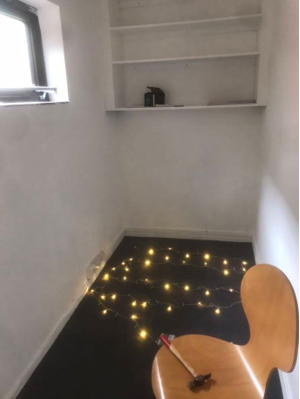
Wellbeing room in the making
To include everyone in the creation of this special place we painted a handprint tree, with every girl in the house to provide a leaf.
In spite of COVID, the wellbeing room was officially opened in September and will hopefully supply reassurance and support to many young women to come.
With New Year came my resolution to create my own podcast: “How are you? (really)”. This mental health podcast promotes self-care and provides a platform for me and others to share our mental health experiences to show others they are not alone. Starting with an episode on self-care, it has grown to include episodes focusing on specific mental illnesses and topics like stress management and body image. I hope to continue this to help as many people as I can promoting seeking professional help and healthy coping strategies.
A Charlie Waller mental health trainer, Debbie Spens, first opened my eyes to giving mental health talks to young people when she presented to my year group, and I was given the opportunity to chat to her. To supplement the mental health support in the school I began mental health talks with pupils, focussing on self-care and removing stigma. The unique opportunity to speak to young people as an equal, rather than an older authority figure easily distanced from issues we experience, was incredibly special to me. The openness and sincerity in these talks was amazing to see, particularly the boys’ encouragement and support of each other vastly contrasting with the stereotype. Sharing ways to manage stress and support others has been so important during the pandemic, with the huge impact on mental health seen both nationally and among my peers struggling through uncertain A Levels.
The success of talks at my school saw me go to my prep school to speak to younger pupils of 10 to 13, giving me new opportunities to speak to a new generation about the importance of mental health. The eagerness to share and learn of these younger individuals really gave me hope of a future of people who prioritise their own and others’ mental health.
Attend our webinars on the teenage brain
In November and December 2021, we are hosting two webinars covering all things teenage mental health, based on the latest understanding of neuroscience and developmental psychology with practical strategies to help attendees understand the changes teenagers are going through, and what they can do to support them. There will be webinars on two topics: The Teen Brain Matters and The Teenage Brain and Eating Disorders.
They're aimed at psychologists and psychology students, parents, carers and education staff, and anyone else interested in learning more about the teen brain.
Related
Popular
Upcoming event
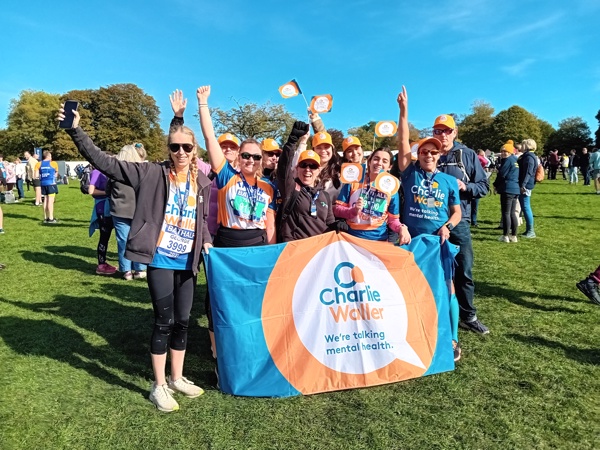
Join us for the Bath Half Marathon to support young people and their mental health!

The Charlie Waller Trust
The Charlie Waller Trust is a registered charity in England and Wales 1109984. A company limited by guarantee. Registered company in England and Wales 5447902. Registered address: The Charlie Waller Trust, First Floor, 23 Kingfisher Court, Newbury, Berkshire, RG14 5SJ.
Copyright © 2025 The Charlie Waller Trust. All rights reserved.

